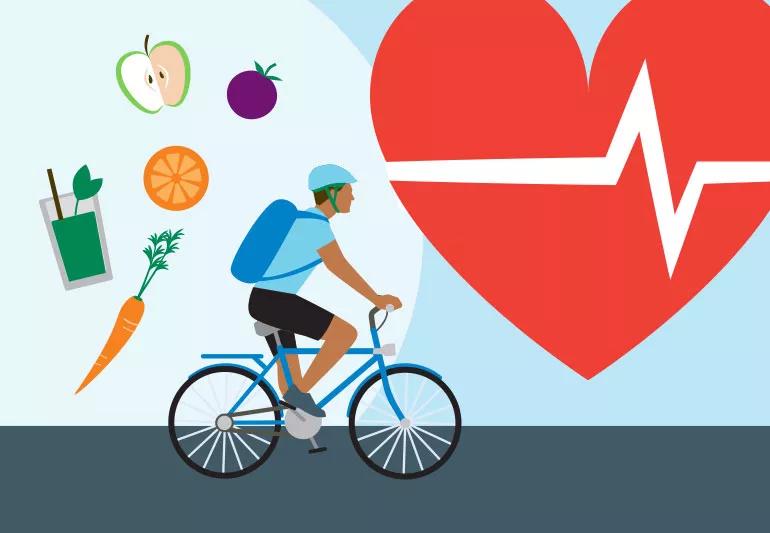Making healthy lifestyle changes ahead of surgery can help you avoid AFib after

Image content: This image is available to view online.
View image online (https://assets.clevelandclinic.org/transform/91b88381-7a00-469f-b76b-9555be1140fa/exercise-Eat-Healthy-heart-1208604845-770x533-1_jpg)
Biker in foreground with healthy food in air behind him, cycling towards a healthy heartbeat.
Days into recovery from heart surgery, an odd feeling may hit your chest. Your once steady heartbeat — lub-dub, lub-dub, lub-dub — might suddenly switch to the chaotic rhythm of an elementary school band.
Advertisement
Cleveland Clinic is a non-profit academic medical center. Advertising on our site helps support our mission. We do not endorse non-Cleveland Clinic products or services. Policy
This erratic and irregular heartbeat is called atrial fibrillation, or AFib. It’s a common and frightening symptom affecting up to 55% of patients after cardiac surgery, according to some estimates.
So, is there a way to reduce your risk of developing AFib and the complications that can come with it? Let’s look at options with cardiothoracic surgeon Edward Soltesz, MD.
It’s believed that inflammation in the chest following heart surgery contributes to AFib within a week after the procedure, says Dr. Soltesz. But the exact trigger for AFib remains unclear.
AFib is basically a malfunction of your heart’s electrical system, which powers the steady contractions that pump blood through your body. Most people’s heart rates are between 60 and 100 beats per minute. But AFib brings a series of rapid, chaotic pulses that upset your heart’s rhythm and drive it higher or lower. When this happens, your heart doesn’t contract effectively — which means blood isn’t squeezed out properly.
Some cases of AFib can be mild enough to go unnoticed. More severe cases of AFib, however, can lead to fatigue, chest pains (angina) and what’s described as a “feeling of butterflies” in your chest.
“Prevent” may be too strong a word regarding your ability to ward off the development of AFib, but here are four steps you can take ahead of heart surgery to reduce your risk, according to Dr. Soltesz:
Advertisement
If you get AFib, various treatments and medications are available to help get your heart back into its proper rhythm.
Regaining control is important. Untreated AFib can increase your risk of blood clots and stroke. (Fast fact: AFib causes about 1 in 7 strokes, according to the U.S. Centers for Disease Control and Prevention.)
Over time, AFib can weaken your heart and open the door to heartfailure.
“AFib can occur sporadically or persistently — and if it happens once, it’s more likely to happen again,” states Dr. Soltesz. “Talk to your physician before and after surgery about your potential risks and what you can do to decrease them.”
Advertisement

Sign up for our Health Essentials emails for expert guidance on nutrition, fitness, sleep, skin care and more.
Learn more about our editorial process.
Advertisement
It’s important to remember that not everyone heals at the same rate
The short answer from a cardiovascular researcher
Three alternatives to open-heart surgery
Understand what’s going to happen before and after surgery
The Short Answer from a cardiologist
5 ways to lower your infection risk
Most recommended precautions center around minimizing bruising or swelling
Type 2 diabetes isn’t inevitable with these dietary changes
Applying a hot or cold compress can help with pain
Pump up your iron intake with foods like tuna, tofu and turkey